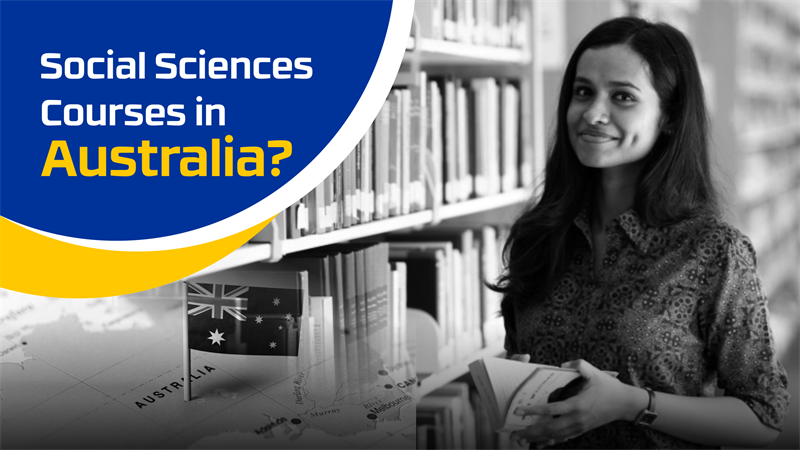Social Sciences Courses in Australia
06 Sep 2022

Interestingly, in Australia, management and business placed second, followed immediately by the social sciences and humanities. Having said that, unlike what stereotypes may suggest, the second-largest research topic, which deals with the human mind and behavior, is not any less complex. Additionally, this subject of study offers a variety of potential future careers, as well as specialties within the relevant courses. People would typically only use one side of their brains in most occupations. Either logic or imagination, reason or creativity, or even analysis or wisdom, is required.
Social sciences courses in Australia
The humanities and social sciences are a distinct field in and of themselves. It teaches you about who you are as a person, the relationships that people have with one another in society, and the objects that are around us. Humanities and social sciences, of course, involve studies involving our behavior and interaction with various contexts, including social, cultural, economic, and a wide range of others. This is merely to be more technical so that you have a true understanding of what it's all about. It also connects our experiences on several levels, exposing us to contemporary problems from a global perspective and addressing potential solutions that current and future generations might take advantage of.
Types of degrees in Social Sciences
Bachelor’s
Australian universities are among the top 100 according to QS ranking. International students can pursue Bachelor’s in fields like Social Work, Arts, Archaeology, Education, languages, law, etc. There are scholarships available for students by the university or government. The duration of this course is similar to that of Indian Bachelor’s i.e. is for three years. The annual fee structure can vary with the different courses. The average range remains from 30,000 AUD to 50,000 AUD.
Master’s or postgraduate
To pursue a Master’s in social sciences, students need to possess a Bachelor’s in the same field or related field. The duration of Master’s can vary from 1 year to 2 years of study. The course fee remain equivalent or more than Bachelor’s field i.e. 30,000 AUD to 40,000 AUD. The universities provide scholarships for international students upto 35%. The international students can easily avail these scholarships.
Research-oriented programs
Australia has ranked as the most demanded study destination for research students. The country was first to eliminate cervical cancer and could serve its citizens with its remedy. The Australian government invests lumpsum amount of funding into research. International students can pursue PhD in any field. Social sciences also get importance when it comes to research. The research is fully-funded and international students are given opportunities to work as research assistants, teaching assistants, etc. The duration of PhD is 3-4 years.
Skills required for pursuing Social Sciences courses
In order to pursue a course, some students possess a skill set while others slowly inherit those skills. This further helps students to lend in the better job opportunities. One can also be aware that companies specifically look for these abilities in candidates for the humanities and social sciences.
Following are the skills:
Strong communication abilities in both writing and spoken: Although this may seem unremarkable, it is important for graduates in this sector to have great communication abilities. You must be able to express yourself clearly both orally and in writing. You may find it easier to express your opinions confidently if you inject a little extra self-assurance.
Inherited Research Curiosity: The courses in social sciences require inquisitiveness, research-oriented mind, and interdisciplinary mindedness. The students who intend to pursue a Bachelor’s or Master’s in the field of social sciences can develop this skill with time and proper training. For instance: if the student is doing a course in English literature, there is a tendency for the curriculum to bend towards academic disciplines like sociology, psychology, political science, etc. This helps students to develop a unique approach towards the main discipline.
Develop cross-cultural understanding: In contrast to other academic fields, humanities and social sciences demand that students be open to the possibility of interactions, negotiations, and information exchanges with persons from different cultural backgrounds. However, students must be aware of cultural diversity and attentive to the needs and peculiarities of others in order to ensure successful relationships with others.
Being open-minded candidate: The courses in social sciences often involve understanding a subject using different forms of medium such as cinematic readings, factoids, and readings. This helps international students to take their knowledge forth and keep an open-mind regarding the changing world and environment. The subjects that are often being studied with open-mindedness are sociology, political sciences, archaeology, English literature and linguistics and many more.
Good problem-solving and critical thinking abilities: Joining Humanities and Social Sciences would indicate that you are ready to take on the process of analyzing and expressing opinions on important subjects. You must be willing to push yourself outside your comfort zone and take on such difficulties if you want to have good critical thinking and problem-solving skills. In the end, considering many solutions to the issue will give you a more varied perspective.
Nurturing reading skills: Any field of research involving sharp reading skills of candidates must imbibe these skills in order to progress in the research field. The field allows one’s ability to read from multiple resources and develop good critical skills, analytical skills and comprehensive skills. Consequently, students can take their long-lasting interests farther in future and pursue a PhD in the respective fields.
Employment Opportunities
The job opportunities can vary according to the qualifications of a candidate. The skills acquired, and knowledge-based practices can enhance one’s ability to do better in the employment sector. Hence, following are some of the professions that international students pursue after the completion of Undergraduate or postgraduate.